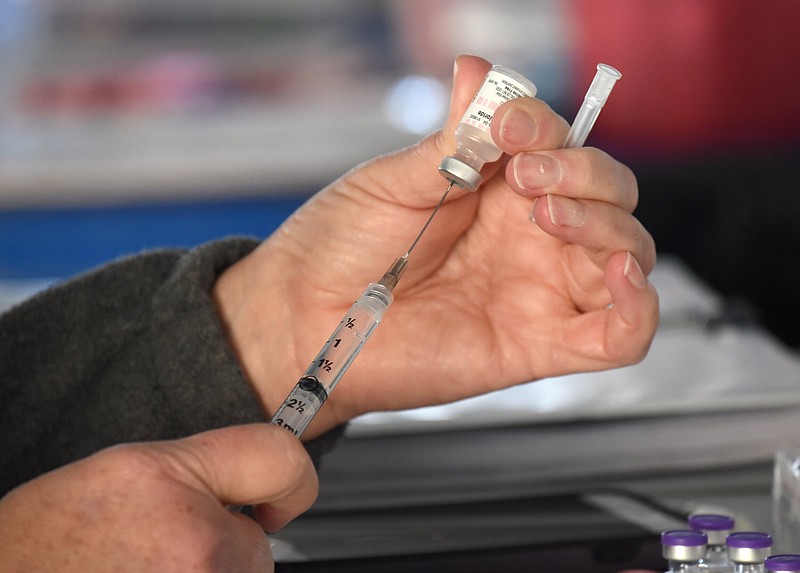A new study commissioned by the Tennessee Department of Health to come up with messaging that will get residents to take a COVID-19 vaccine if they are hesitant to do so came to the conclusion that attitudes are unlikely to change, at least anytime soon.
An initial 96 male and female Tennesseans from varying demographic groups took part in focus sessions where they responded directly to questions about themselves and beliefs toward vaccination. A second portion of the study was then conducted during the first week of April through an online survey of 1,000 adults representing each county in the state.
In their summary of the focus sessions, study authors concluded, "Those that are unwilling will largely remain so."
Whether to receive a COVID-19 vaccine is voluntary, but experts estimate that around 70% of the population needs to be vaccinated in order to return to "normalcy." Tennessee remains among the bottom five of all states in the percentage of residents fully vaccinated at 17.11%, according to the Johns Hopkins vaccine tracker.
The statewide study, conducted by Designsensory Intelligence for the Tennessee Department of Health, had as its goal to "identify public messaging tactics/words/images/influences to overcome the barriers associated with those members of the population who are rejecting or hesitant to receive the COVID-19 vaccine."
Given that only 25% of those initially surveyed believe that herd immunity could be reached if enough people get vaccinated, the study found, "There are basically no words being used today that would empower vaccination. It will take acceptable proof and an understanding/acceptance of current research technology that all is safe with the vaccine. Short of that, it will be the assurance that comes after complete approval (not emergency approval) and 'years of research to document success.'"
The most common objection to the vaccine was the perception that development was rushed. According to the study, respondents who were hesitant to get the injections said they might be comfortable getting a shot in "5-10 years maybe. But I still wouldn't get it because COVID most likely wouldn't harm me any more than the flu anyway."
The COVID-19 pandemic has killed more than 12,000 Tennesseans, compared to about 1,300 to 2,000 deaths per year from influenza prior to 2020.
According to the study, the only messaging that showed any promise was to appeal to potential vaccine takers "for the health of your loved ones."
Messages that showed little to no promise included "so we can all get back to normal," "it will open up the economy faster with sustainability" and "because it's everyone's responsibility."
Even a plea from a clergy member - a common strategy used to overcome vaccine hesitancy - was "surprisingly" found to have no promise, as unwilling vaccine takers said that would make no difference.
"Those unwilling basically fear the unknown and are skeptical of those with an underlying agenda," the study found.
Researchers determined that community-based medical professionals have the highest degree of acceptance when it comes to vaccines, but those with skepticism are not tapping those professionals for advice.
As one respondent put it, "They wouldn't tell me anything I don't already know."
Convincing rural, white conservatives to take a COVID-19 vaccine poses the biggest challenge for Tennessee health officials trying to improve the state's low vaccination rate, according to the study.
"Black and Hispanic populations would lean into family and those in the medical field they might trust to be knowledgeable and aware of what the vaccines can do. Possibly their physician," the study found. "The white respondents for the most part claim to trust NO ONE! Those that do trust would likely listen to their physician, pharmacist, CDC and independent review boards."
Among those who were not vaccinated, 14% said they were just waiting on an appointment, 20% were willing but not yet ready, 22% were unwilling but open to consideration, 18% were unwilling and would not consider taking the vaccine, and the rest were undecided.
The willing-but-hesitant group had attained a higher level of education than the unwilling and not-interested group.
The report noted that "there is an inherent predisposition of not getting vaccines," in that 45% of the respondents do not get an annual flu shot. That number increased to 52% for white, rural conservatives and to 63% for respondents who said they were unwilling to be vaccinated against COVID-19.
"The results are consistent with national trends and show that Tennesseans want more information from trusted sources as they make their decision," Tennessee Health Department Commissioner Dr. Lisa Piercey said via news release. "This market survey was an important step in identifying where we can be helpful in providing information about safety and effectiveness."
As a result of the report, the department of health plans to coordinate more messaging to inform Tennesseans about the safety, efficacy and availability of COVID-19 vaccines, according to the news release.
People seeking COVID-19 vaccine appointments can visit covid-19.tn.gov or vaccinefinder.org to find a local vaccine provider.
Contact Elizabeth Fite at efite@timesfreepress.com or follow her on Twitter @ecfite.
